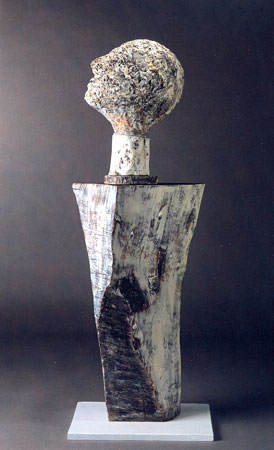Gretchen Giles, The Bohemian
The ancient academic school of formalism dictates that a work of art should stand apart from the artist. Biographical concerns, personal habits, and documented quirks should remain resolutely banished from the mind while in the presence of the artist’s work. That’s all very well and good for the high, sere aerie of academia, but when viewing the heavy-headed beachwood sculptures of Cloverdale artist Carol Setterlund, formalist strictures give way to the simple jaw drop.
Standing perhaps five feet tall and weighing perhaps 100 pounds after Thanksgiving dinner, Setterlund nonetheless snaps on a heavy protective helmet and wields a chain saw to make her figures. She tramps Jenner beaches alone, canny-eyes with a rope, to find her massive logs. And then—like a 21st century pyramid builder, a crafter of Stonehenge, or a Mayan architect—she somehow manages to get these huge, water-soaked burdens across the sand, up a slippery trail, and loaded into the car home, where she’ll drag them into the studio to create tall, secretive busts of incredible solitude.
Walking into a Setterlund exhibit—which is easy to do as he “recent Works” shows through June 23 at the Erickson Fine Art Gallery in Healdsburg—is to be reminded of the ineffable loneliness sometimes found in a crowd. Working from a mythology both private and profound, Setterlund peoples the Erickson’s elegant space with nothing less than 21 relics of the soul.
 Primitive, totemic, and brutal, Setterlund’s figures are often tall piled spindles of wood discs built upon each other, topped with a block and towering over six feet. But the “bodies” are useless; it’s the heads that command. Seeming to emphasize the raw intellect of taste and smell and touch over sight and sound, her pieces sport oversized noses and gaping, soiled mouths. Many are blind; their ears, blocked and ineffectual.
Primitive, totemic, and brutal, Setterlund’s figures are often tall piled spindles of wood discs built upon each other, topped with a block and towering over six feet. But the “bodies” are useless; it’s the heads that command. Seeming to emphasize the raw intellect of taste and smell and touch over sight and sound, her pieces sport oversized noses and gaping, soiled mouths. Many are blind; their ears, blocked and ineffectual.
However, the sense of sight is most rewarded in meeting these pieces. While the long stretch of Alberto Giacometti’s figures spring to mind upon viewing Setterlund’s sculptures, his work was purportedly made to be seen from a nine-foot perspective—evidently the distance at which he sat from his models when working. Setterlund’s are best seen from the intimate distance of an inch.
Appearing bleached and whitened at first, in close proximity her works are riotously colored, the white pushed back to reveal blues, purples, oranges, pinks—the pulsing hues of the corporeal. The wood is meticulously pitted and worked, hand-knifed into order and then gently salved with putty. One feel an immense empathy for such pieces as Charade, a Buster Keatonesque figure with haywire hubcap hat in mawkish makeup. In fact, one feel an enormous empathy for each of these solitary figures, so like us in their isolation, defects and beauty.
Above all, Setterlund’s pieces bespeak about basic human desire to reproduce, to leave behind a process, be it progeny or statuary. Like the mysterious heads on Easter Island, her works seem to be mute testaments to—if nothing else—at least making a mark on the good green earth during one’s too-brief sojourn. We haven’t much evolved, she seems to report, when beach-drowned wood is still dragged ashore to be fashioned with meticulous roughness into representations of…just plain old us. Setterlund furthers this by adding crowns and wings and breastplates to her figures made from scrap metal and nautical rope and stiffened kelp and old rusty wire. Others’ castoffs and nature’s brusque actions coalesce in human hands to form—more humans?
Drawing from history (Ajax, Minos, Ptolemy, Anacreon), opera (Capriccio), wordplay (Epigram), and fancy (Pirouette), Setterlund creates her own visual vocabulary peopled with fools, freaks, elders, the sainted, the sane, and the sage. Yes, indeed—back to us.
Gretchen Giles
The Bohemian
May 2002